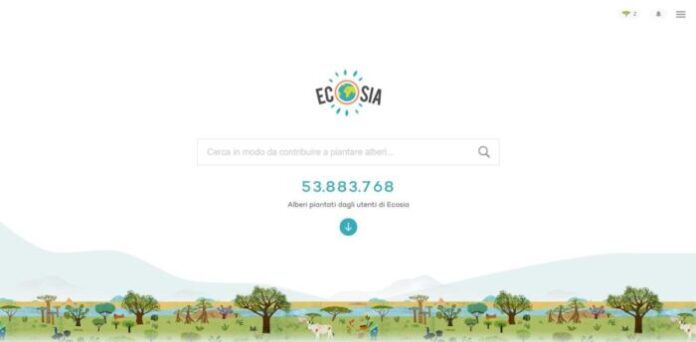
Ecosia is the first green search engine, which claims to donate 80% of the proceeds from online advertising to reforestation programs, for example in the Amazon and Burkina Faso. Ecosia was born in 2009 from an idea of its founder, the German Christian Kroll and works in partnership with Bing (owned by Microsoft), Yahoo and initially also with Wwf (but only the German one).
Making your own contribution to the environment through the search engine is very simple: just download the extension available for all browsers by clicking on the download button and start browsing. From that moment, the default search engine will be Ecosia, which will buy and plant trees where necessary with online advertising revenue. The search engine website states that every time a user searches through Ecosia.org, an average of two square meters of rainforest is “saved”.
To date, more than 2 million users are using Ecosia actively as a search engine and more than 52 million and 800 thousand trees have been planted which means an average tree every 1.1 seconds for a total of almost 9 million and 100 thousand euros donated. At the moment, there are sixteen active projects that foresee the reforestation of as many areas: in Burkina Faso to contain the advance of the desert; in Peru in the region of San Martin that in the 80s suffered one of the heaviest deforestation ever made by man; and in Madagascar where the laying of mangroves should favor the local fauna and repopulate certain areas that once held the world record for biodiversity.
To these were added projects in Uganda, to allow chimpanzees to procreate in safety; in Indonesia, where they are trying to make the environment healthier and create a viable alternative to palm oil; in Haiti, devastated by the earthquake that has destroyed crops in Colombia where they are trying to replace coca plantations with coffee plantations; in Senegal to create cultivated fields and improve water quality; in Morocco where through plantations of fruit trees is being prevented depopulation of rural areas; in Tanzania where eco-sustainable tourism is aimed; in Brazil for reforestation of rainforests and areas around Sao Paulo; in Kenya, where the recipients of the funds are mainly women who are involved in preserving biodiversity; in Ghana and in Ethiopia, where the aim is to bring water and new food sources through the trees; in Nicaragua where the aim is to combat soil erosion; in Spain to preserve the great biodiversity of the European country.
The reforestation projects supported by Ecosia – reads the Facebook page of the search engine – would have provided work to about 30,000 people over time.



































